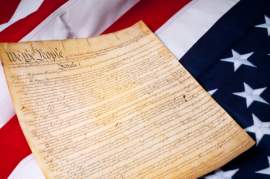
Gun Control Laws You Must Know

Current gun control laws in the United States are varied by state; federal level laws are most often very broad, widespread rules, as opposed to specific, nuanced, details rules on how guns are to be regulated. Nonetheless, understanding the most important federal gun control laws of today will be important for any who aim to become gun owners.
Title I of US federal gun control laws is the Gun Control Act of 1968. This gun control law prohibits certain categories of individuals from possessing firearms. Some of the categories include convicted felons, fugitives from justice, unlawful drug users, and those who have been dishonorably discharged from the military.
This gun control law also prohibits people younger than 18 years old from "possessing handguns or handgun ammunition with certain exceptions for employment, target practice, education," and certain outlined defensive purposes.
The Gun Control Act is also the first gun control law that set up Federal Firearms Licenses, for individuals and companies who wish to sell firearms. No one and no company without a Federal Firearms License could sell guns, under this gun control law's provisions.
Title II of America's federal gun control laws is the National Firearms Act of 1934. The act, while old and somewhat overruled by newer gun control laws, still hold relevance on America's general gun control policies.
This particular gun control law enforces the regulation of a number of types of firearms, including machine guns, short barreled rifles, short barreled shot guns, suppressors, and "destructive devices," which includes grenades, bombs, and the like. In essence, the act ensures that these items will only be made by specifically licensed gun makers in America, and that their usage will generally, therefore, be curtailed.
The Gun Control Act of 1968 built onto the regulations set up by this earlier gun control law, by stating that the firearms regulated by the NFA were illegal to import, unless there could be a clear and reasonable case made for those firearms being used for sport. Thus, the two gun control laws together restrict these categories of weapons strongly, as they cannot be imported, and can only be made in America by specifically licensed companies.
The next most important gun control law is the Brady Handgun Violence Prevention Act. This act required that those who would purchase guns be run through a background check before they be allowed to actually obtain a gun.
This is one of the most hotly contested gun control laws in recent memory, as it originally greatly increased the waiting period required for obtaining a gun; when the gun control law came out, there was no quick and easy way to perform a background check. Four years later, however, the National Instant Criminal Background Check System, was developed, and is implemented for all background checks made to satisfy the requirements of this gun control law.
The NICS system allows for background checks to take place often over the space of a single phone call. Should a request for a background check be placed, and no denial comes within three days, then the individual may purchase a firearm, even if the background check technically did not complete.
There are other gun control laws of significance, including a current proposed reinstatement of the ban on assault weapons which expired in 2004, but the majority of these are likely to be state, not federal, laws, particular to your own home. The previously mentioned laws are the most important federal gun control laws for gun purchasers.


















